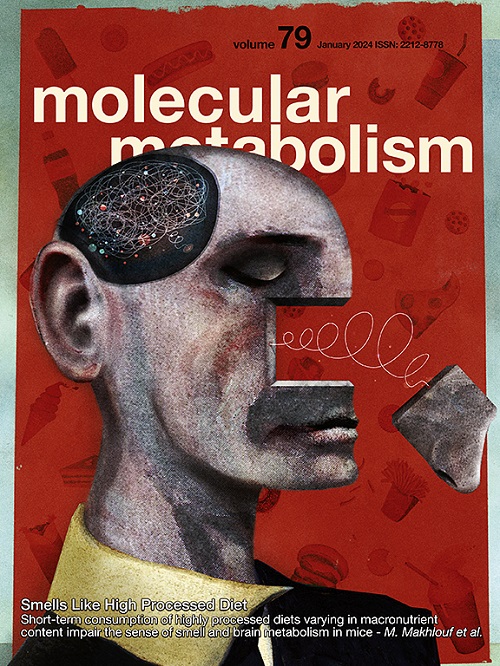杏仁核芳香酶控制食物摄入、奖励和体温调节。
IF 7
2区 医学
Q1 ENDOCRINOLOGY & METABOLISM
引用次数: 0
摘要
雌激素通过作用于中枢神经系统受体,在能量平衡控制中起关键作用。一般认为,性腺是这些受体雌二醇的主要来源。然而,芳香化酶,唯一负责雌二醇合成的酶,也存在于大脑中,其在能量平衡中的作用仍未被充分研究。我们在大鼠杏仁核神经元中发现了高芳香化酶表达,并研究了脑源性雌二醇是否在能量平衡和食物奖励控制中发挥作用,特别是在杏仁核中。在成年雄性和雌性大鼠中,使用临床使用的抑制剂来曲唑对全脑芳香化酶进行慢性药理抑制,并使用病毒遗传学方法对杏仁核中的芳香化酶进行特异性控制,同时结合一系列评估摄食行为和体温调节的测量。我们的研究结果表明,大脑芳香化酶的抑制导致女性食物摄入量增加和体重增加,而男性食物摄入量减少。这是由高脂肪饮食对食物偏好的相反影响所驱动的。杏仁核芳香酶敲低足以增加瘦肉和肥胖雌性的摄食和体重,并增加内脏脂肪;在男性中未观察到效果。即使没有卵巢类固醇(已经导致肥胖),杏仁核芳香化酶的缺失也会进一步加剧肥胖饮食导致的体重增加和贪食。在女性中,暴食是由增加的膳食量和增加的食物动机行为驱动的,对富含脂肪而不是富含蔗糖的食物的偏好增加了。杏仁核芳香酶的缺失也会导致体温调节紊乱,雄性体温升高,而雌性体温降低,这与棕色脂肪组织产热的改变有关。总的来说,我们的数据表明,大脑中雌二醇的合成对体重和摄食行为的控制以及体温调节都是必要的,以一种性别特定的方式。我们的发现可能具有翻译和临床相关性,因为芳香酶抑制剂在临床中广泛使用,并且芳香酶最近在人类杏仁核中被发现。本文章由计算机程序翻译,如有差异,请以英文原文为准。

Amygdala aromatase controls food intake, reward, and thermoregulation
Objective
Estrogens play a pivotal role in energy balance control, by acting on its CNS receptors. It is generally assumed that the gonads are the main source of estradiol for these receptors. However, aromatase, the sole enzyme responsible for estradiol synthesis, is also present in the brain, and its role in energy balance remains largely unexplored.
Methods and Results
We identified high aromatase expression in the neurons of rat amygdala and investigated whether brain-derived estradiol, particularly within the amygdala, plays a role in energy balance and food reward control. Both whole brain chronic pharmacological inhibition of aromatase with a clinically utilized inhibitor, Letrozole, and a virogenetic approach to manipulate aromatase specifically in the amygdala were used in adult male and female rats, in conjunction with an array of measurements assessing feeding behavior and thermoregulation. Our results show that inhibition of brain aromatase results in increased food intake and body weight gain in females, but reduced food intake in males. This was driven by opposing effects on food preference for a high-fat diet. Amygdala aromatase knockdown was sufficient to increase feeding and body weight in lean and obese females, with increased visceral adiposity; effects not observed in males. Even in the absence of ovarian steroids, which already results in obesity, loss of amygdala aromatase further exacerbated weight gain and hyperphagia on an obesogenic diet. In females, hyperphagia was driven by increased meal size and increased food-motivated behavior, with increased preference for fat-rich but not sucrose-rich foods. Loss of amygdala aromatase also led to disrupted thermoregulation, with increased temperature in males but reduced in females, linked to alteration in brown adipose tissue thermogenesis.
Conclusions
Collectively, our data reveal that estradiol synthesis in the brain is necessary for body weight and feeding behavior control, as well as thermoregulation, in a sex specific manner. Our findings may have translational and clinical relevance, as aromatase inhibitors are widely used in the clinic, and aromatase has recently been found in the human amygdala.
求助全文
通过发布文献求助,成功后即可免费获取论文全文。
去求助
来源期刊

Molecular Metabolism
ENDOCRINOLOGY & METABOLISM-
CiteScore
14.50
自引率
2.50%
发文量
219
审稿时长
43 days
期刊介绍:
Molecular Metabolism is a leading journal dedicated to sharing groundbreaking discoveries in the field of energy homeostasis and the underlying factors of metabolic disorders. These disorders include obesity, diabetes, cardiovascular disease, and cancer. Our journal focuses on publishing research driven by hypotheses and conducted to the highest standards, aiming to provide a mechanistic understanding of energy homeostasis-related behavior, physiology, and dysfunction.
We promote interdisciplinary science, covering a broad range of approaches from molecules to humans throughout the lifespan. Our goal is to contribute to transformative research in metabolism, which has the potential to revolutionize the field. By enabling progress in the prognosis, prevention, and ultimately the cure of metabolic disorders and their long-term complications, our journal seeks to better the future of health and well-being.
 求助内容:
求助内容: 应助结果提醒方式:
应助结果提醒方式:


